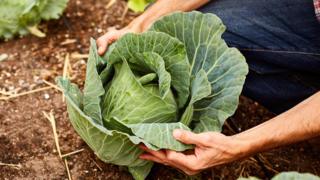 Image copyright Getty Images
Image copyright Getty ImagesScientists say they have discovered why some vegetables – including cabbage, broccoli and kale – can reduce the risk of bowel cancers.
That cruciferous veg is good for the gut has never been in doubt but a detailed explanation has been elusive.
The team at the Francis Crick Institute found anti-cancer chemicals were produced as the vegetables were digested.
Cancer Research UK said there were plenty of reasons to eat more veg.
The work focused on how vegetables alter the lining of the intestines, by studying mice and miniature bowels growing in the lab.
Like the skin, the surface of the bowels is constantly being regenerated in a process that takes four to five days.
But this constant renewal needs to be tightly controlled, otherwise it could lead to cancer or gut inflammation.
And the work, published in the journal Immunity, showed chemicals in cruciferous vegetables were vital.
From kitchen to cancer prevention?
The researchers investigated a chemical called indole-3-carbinol, which is produced by chewing such vegetables.
“Make sure they’re not overcooked, no soggy broccoli,” said researcher Dr Gitta Stockinger.
The chemical is modified by stomach acid as it continues its journey through the digestive system.
In the lower bowel, it can change the behaviour of stem cells, which regenerate the bowel lining, and of immune cells that control inflammation.
The study showed diets high in indole-3-carbinol protected the mice from cancer, even those whose genes put them at very high risk of the disease.
Without the protective diet, the gut cells divided uncontrollably.
Dr Stockinger added: “Even when the mice started developing tumours and we switched them to the appropriate diet, it halted tumour progression.”
Signs of bowel cancer include persistent:
- blood in the stools
- changes in bowel habits, such as going to the toilet more often
- tummy pain, bloating or discomfort
Dr Stockinger said the findings were a “cause for optimism”.
She has reduced the amount of meat she eats and now consumes at lot more vegetables.
She told the BBC: “A lot of dietary advice we’re getting changes periodically – it is very confusing and not clear cut what the causes and consequences are.
“Just telling me it’s good for me without a reason will not make me eat it.
“With this study, we have the molecular mechanisms about how this system works.”
Prof Tim Key, from Cancer Research UK, said: “This study in mice suggests that it’s not just the fibre contained in vegetables like broccoli and cabbage that help reduce the risk of bowel cancer, but also molecules found in these vegetables too.
“Further studies will help find out whether the molecules in these vegetables have the same effect in people, but in the meantime there are already plenty of good reasons to eat more vegetables.”
Follow James on Twitter.
